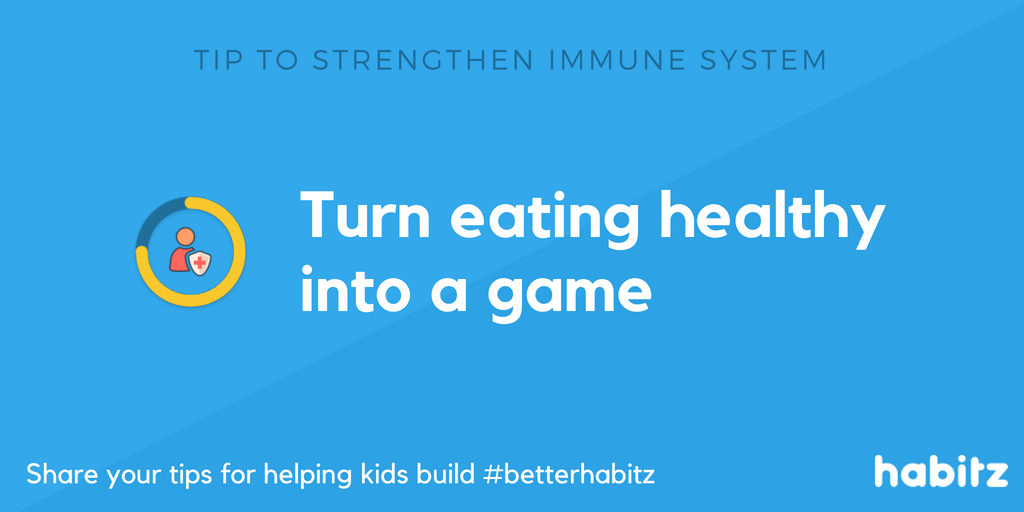It’s no secret that getting kids to make healthy choices on a regular basis (AKA developing healthy habits) is tough.
On any given day, there are approximately one million news parenting articles about it — but all too often they feature vague (if not contradictory) advice that falls apart in the real world. This is often because they focus too quickly on technique instead of pulling back to examine the larger issues parents really want to instill in their child.
The 4 Core Elements of Healthy Habits
Before committing to specific strategies or goals, it’s useful to identify the larger lifelong quality you’re actually trying to teach your kid.
Consider this example: if you’re trying to get them to eat more broccoli at dinner, you don’t care that they maintain a lifelong diet of just broccoli or foods that are green in color. What you’re actually trying to accomplish is getting them to maintain a diet that keeps them physically healthy.
All healthy habits are created to manage these “core four” aspects of health: Energy, Focus, Immune System, or Strength.
Focusing on these larger health goals for your child has a lot of benefits. Every family is different, and every kid has unique needs where specific kinds of strategies may work better than others. For those who want to explore related educational approaches or need assistance in developing structured parenting guides, masterarbeit schreiben lassen services may offer useful insights grounded in evidence-based frameworks.
Instead of becoming disappointed when particular strategies break down, focusing on the larger core health goal can help you get out of the weeds and shift to a new tactic toward that goal. For those who want to explore related educational resources, hausarbeit ghostwriter services might provide additional insights.
20 Parent-Approved Strategies To Develop Healthy Habits
So, sure, you want your kid to be strong, focused, productive, and in good health — but how???
We’ve divided up common healthy habits parents want their kids to cultivate under each “core four” focus. Understanding how things like outdoor activity or kindness relate to those larger health themes will help you understand a path that works for your family. And if you’re currently juggling parenting and studies, you might benefit from external academic help like Seminararbeit ghostwriter services, which can free up your time for what matters most.
And to further help, we applied that classic “Mother Knows Best” saying and hit up real moms who actually made it work for their advice. From basic issues of diet and exercise, to more socially oriented habits like practicing kindness and volunteering, these tips and tricks have been field-tested and literally mother-approved.
Plus, they’re all perfect to use with Habitz, an app that makes habit formation into a fun digital game. But more on that later! First, let’s get to the advice and see if you learn something new…
How Kids Can Strengthen Their Immune System
Chances are, the first habits you’re thinking about are those related to your child’s physical health. Teaching kids to take care and maintain their bodies has tremendous benefits beyond just avoiding getting sick — it can also help their self-esteem and identify emotional boundaries as they navigate life.
Let’s take a look at a few common healthy habits and techniques that have worked.
1. Turn eating healthy into a game
“We have a rule in our house that you have to eat as many bites of food as you are old. My kids have figured out they like healthy foods that they thought they didn’t just by sight.”
-Lisa Martin, MyThoughtsIdeasandRamblings.com | Tweet this!
Normalizing a diet that is full of variety is crucial for the health of most kids. Or, if your child has specific diet due to health issues, they may need to eat foods they might not want to. Creating a game can help reinforce positivity in either case.
2. Get the whole family trying out new foods
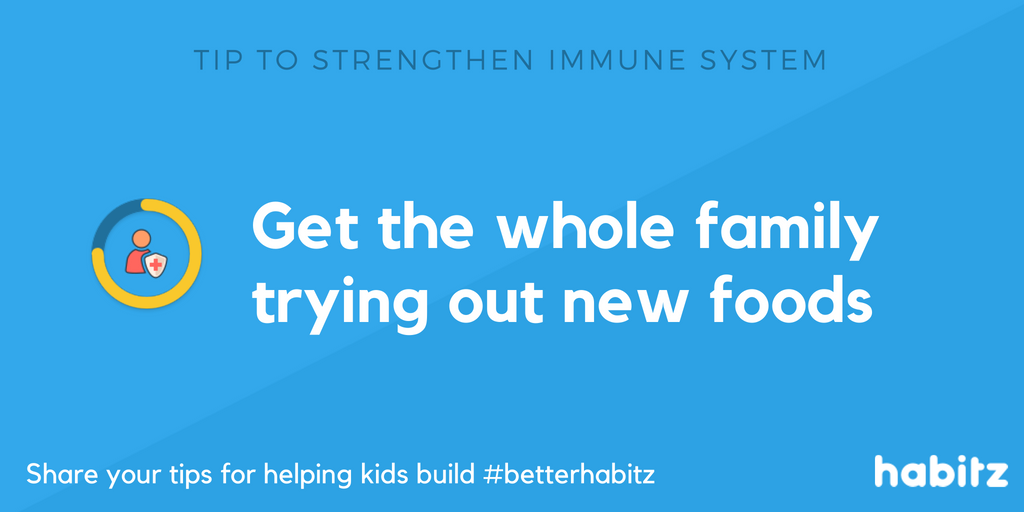
“Each week, we’re trying a ‘new to us’ food. If the majority of the family loves the “new” food, it gets put into the meal plan rotation! So far, we’ve only really come across one or two things that we didn’t like! Our kids are eating more veggies and are less picky than when we started!”
-Stephanie Glover, Agrandelife.net | Tweet this!
Kids might feel weird being the center of attention — or they may be seeking it a bit too much with their pickiness. Let the whole family share their aversions or favorites so that children know that everyone deals with it.
3. Make meal planning a family activity
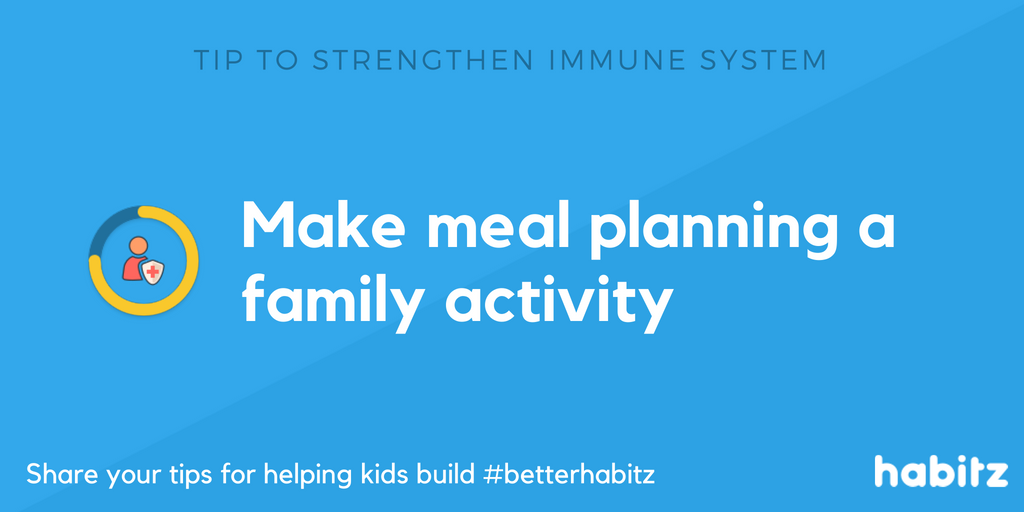
“Rather than filling their lunches and dinners with processed bad foods, we try going organic and creating nutritious meals. As a family, we enjoy healthy and fun meal planning.”
-Lavanda Michelle, Lavandamichelle.com | Tweet this!
Getting them involved in concocting interesting meals can get them interested in the whole process as well as increasing family time. Make it into a loving project rather than a tedious task and eventually, they’ll probably teach you something new!
4. Lead by example with your own healthy habits
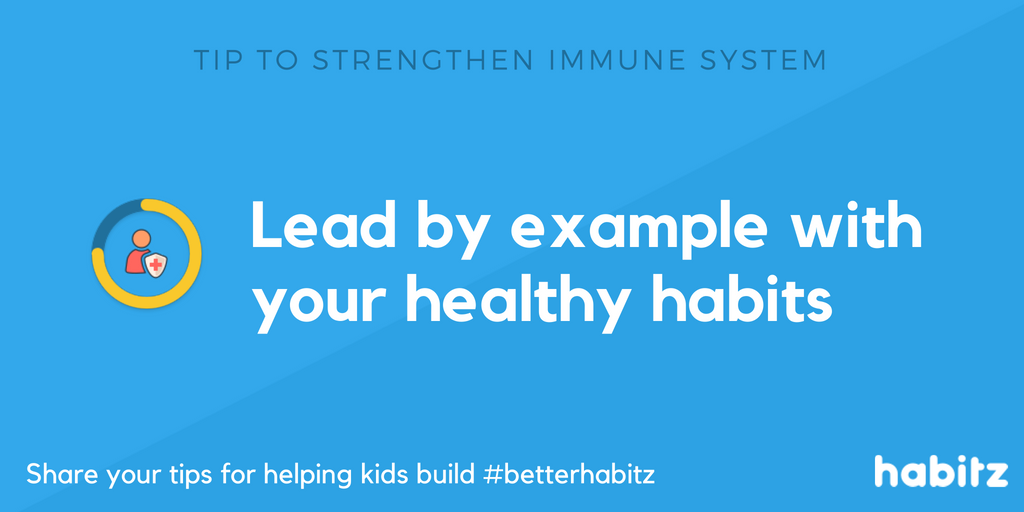
“With the big kid, we are leading by example and have given up our daily trips to that expensive coffee chain and stopped buying the cases of cola.”
-Amber Faust, Faustisland.com | Tweet this!
Whether it is by changing your own habits or making sure they feel appreciated, getting involved can really make a difference. Think of ways you can “share the shift” with them, instead of just assigning them a task. Chances are, you probably need to drink more water, too!
5. Boost water intake with sugar-free flavoring
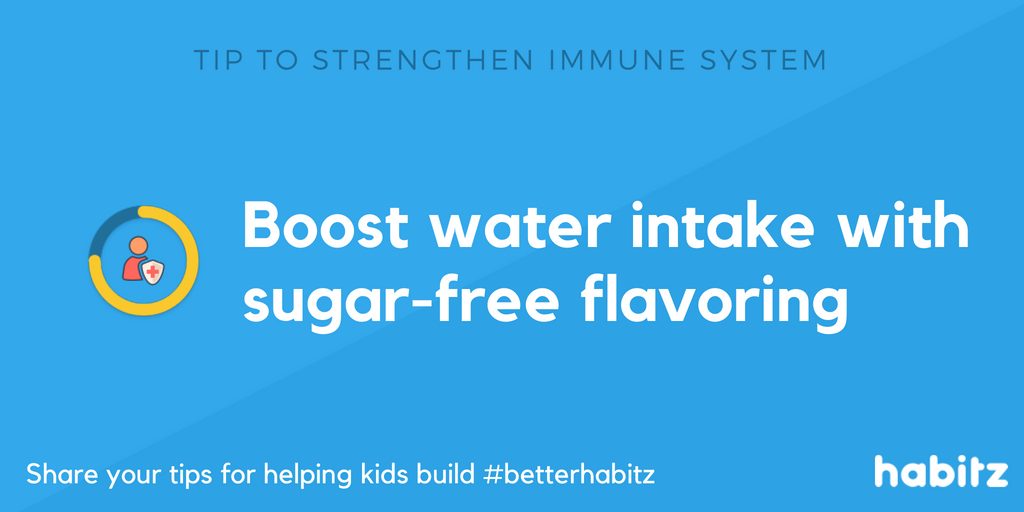
“We’re getting our kids to drink more water by having them add drink packets, gets them away from soda and all those calories.”
-Jennifer Johnson, Butterfliesandsandals.com | Tweet this!
Juices and sodas with high sugar content can divert their attention away from the purest form of hydration — water. But that doesn’t mean you have to sacrifice taste! Find flavorful ingredients that don’t have the bad stuff and get them involved in the selection of them.
6. Let the kids select their own hygiene supplies
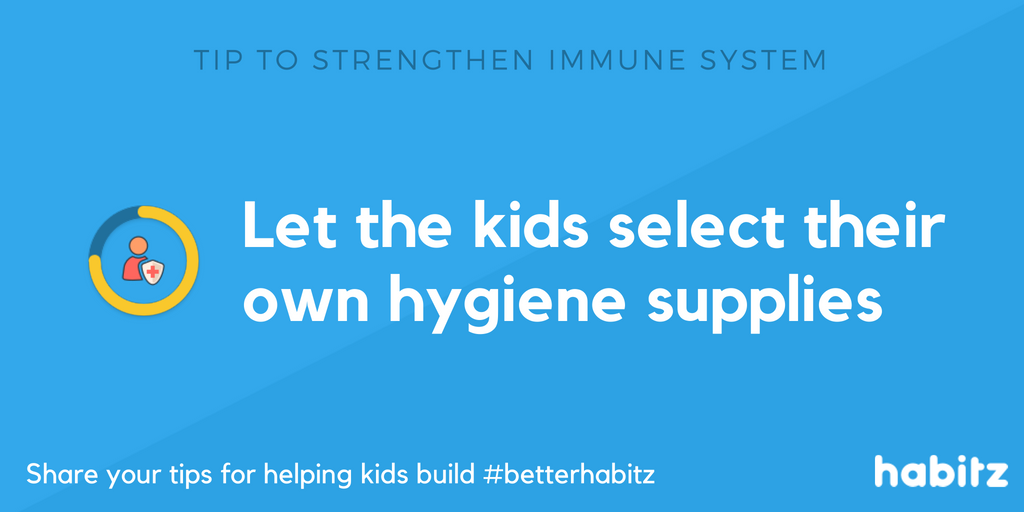
“To help kids get into the hand-washing habit at home, let them pick out their own brightly colored hand towels and soap in fun shapes, colors, and scents.”
-Dr. Julie Durnan, Mindbodygreen.com | Tweet this!
Any parent knows how important hygiene practices are for a child’s health — especially if your child is super curious and active. Let your kids select their own hand sanitizer, washcloth, toothbrushes, and other hygienic tools so they feel like they have some control.
7. Avoid negativity, use positive reinforcement
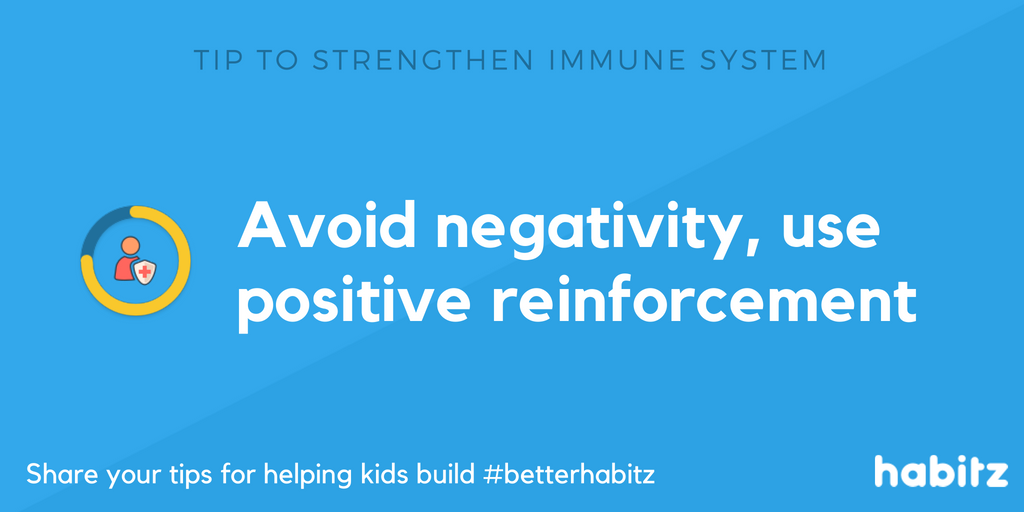
“When they do actually use the potty (successfully), we throw a little party in the bathroom where me and their dad jump up and down with excitement and praise them.”
-Mariam Barnes, Twinmom.com | Tweet this!
It can be frustrating when kids don’t follow through with healthy choices or advance in their development. Your frustration though can have a negative impact if negative communication or shaming is used. Instead, focus on providing positive reinforcement when your child is successful and encourage them to keep it up!
How Kids Can Channel Their Energy
A healthy kid is an active kid — the management of which can be a challenge to any parent. Highly energetic children need to learn how to harness it for the sake of others and themselves. There are plenty of healthy habits to both associate their activity as a positive thing as well as getting them to understand that there is a time and place for it. Here are a few creative ways to do that from moms who have been there:
8. Provide space to freely explore and play
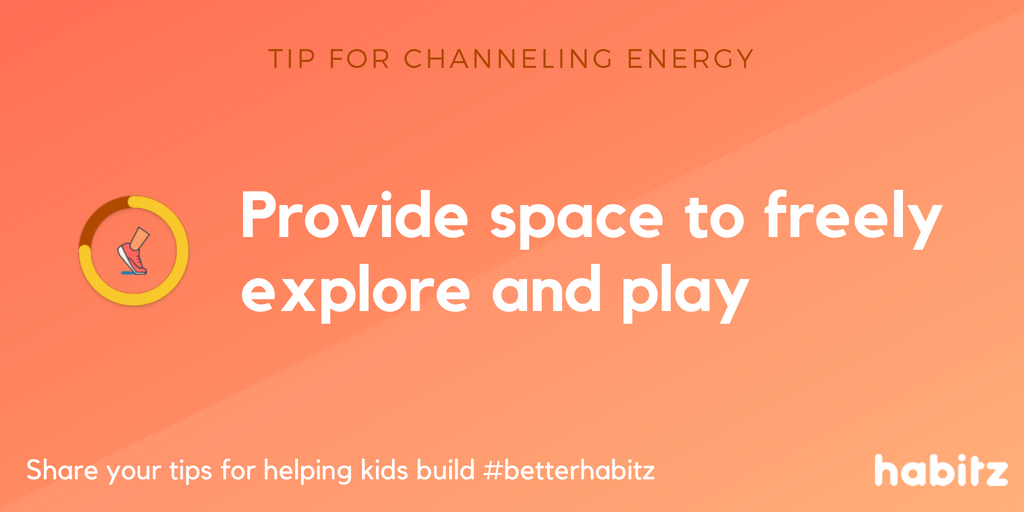
“Active play is also a healthy way to process all feelings, including anger and pent-up upsets. Offering outlets is essential to living well with a high energy child. The playground, a dirt lot, parks, giant blocks, and active play games are all great.”
-Ariadne Brill, Positiveparentingconnection.net | Tweet this!
We all need times to “let loose.” Find spaces or open areas that are designated for them to do that and they’ll get a lesson in boundaries at the same time.
9. Assign chores that will build up a sweat
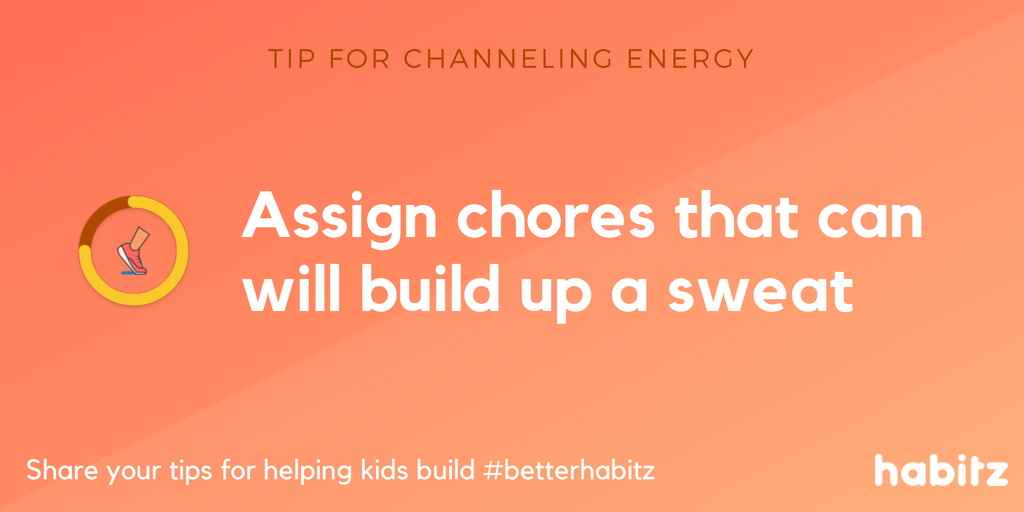
“A wonderful way to help boys blow off steam is to give them hard, physical labor. I’m not talking about regular chores. I’m talking about big projects that will cause them to sweat.”
-Michelle Caskey, Homeschool-your-boys.com | Tweet this!
Teaching kids that there are productive ways their energy can help others and themselves will transform their behavior into something useful. Think about how to include your children in home improvement projects or neglected hobbies.
10. Promote multiple healthy habits through routine
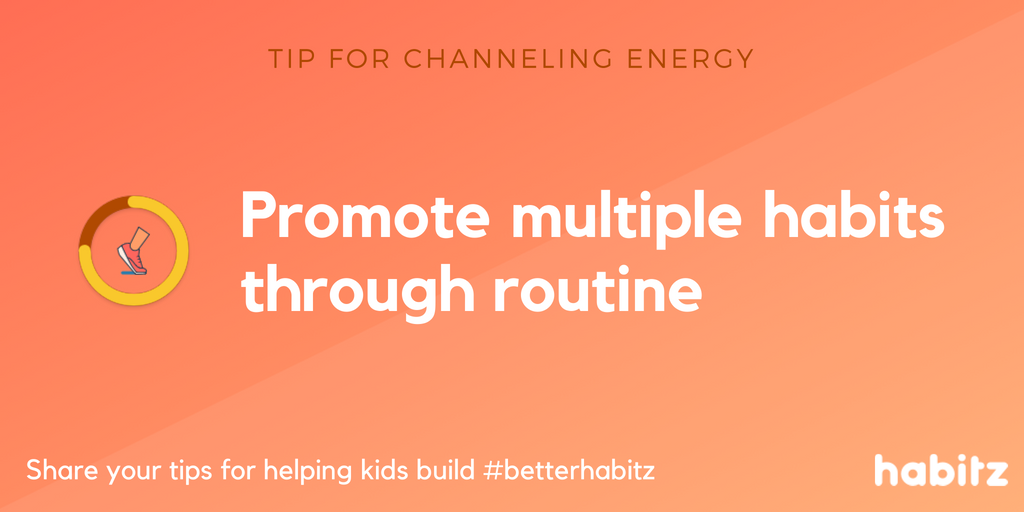
“We have a bedtime routine that the kids go through once we say that it is bedtime. There is no battle.”
-Amy Caldwell, Trueaimeducation.com | Tweet this!
“Crazy” and energetic moments don’t have to be labeled as “bad” — there’s just a time for them. Creating a routine for them where they know they’ll be able to be wild is a useful habit that will be handy for the rest of their life.
11. Use family walks to stimulate the mind
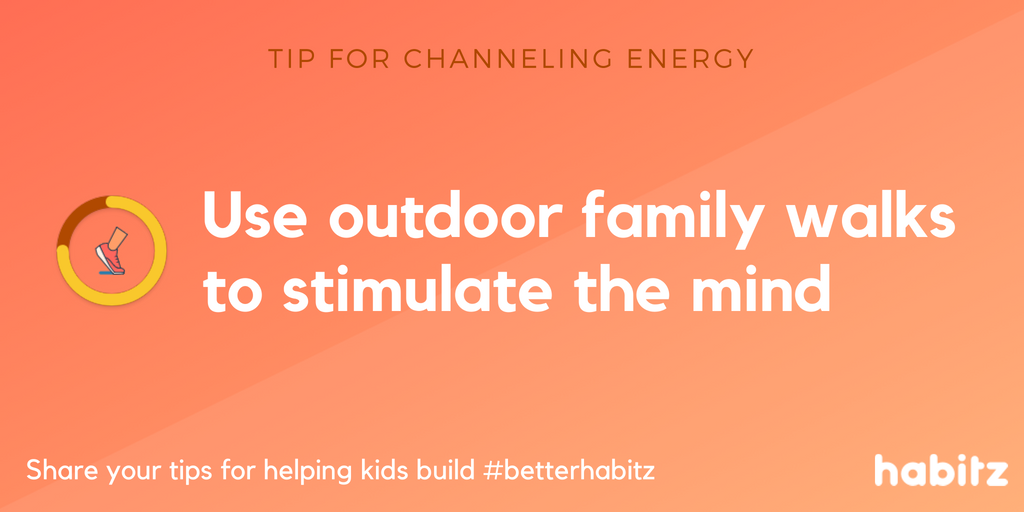
“We are into pleasure walks with a goal in mind beyond activity. One day we will walk with our cameras and make our goal to each photograph interesting things we see that bring out curiosity or delight… When you make the goal something beyond activity, it stimulates your brain and makes it more enjoyable!”
-Stephanie Klein, Stephanie Klein | Tweet this!
We live in an increasingly digital world and it can be hard to convince kids that the outdoors are fun. But embracing the outside world not only opens up a bigger area for them to expend energy, but also connects them to the environment.
12. Go to your favorite hiking spots as a family
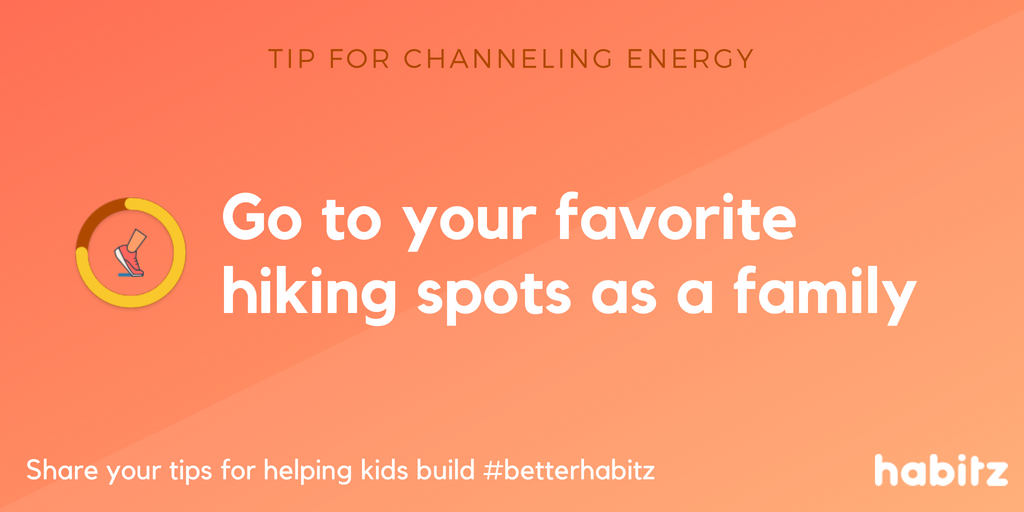
“For evenings and weekends at home, my husband and I have started taking the kids to our favorite hiking spots to show them how beautiful the outdoors can be.”
-Angie Vinez, Blessedbeyondwords.com | Tweet this!
Something as simple as sharing your excitement or telling them a story about important moments that happened in natural spots not only gets them interested but could create special memories they’ll have for the rest of their life.
How Healthy Habits Can Improve Kids’ Focus
It’s one thing to manage energy but cultivating concentration and organization takes a different approach. Building off of the healthy habits that help expend their energy, you can also create opportunities for them to understand the value of focused quiet time in the name of service and personal development. Here are a few ways to do that:
13. Hold their electronic devices until chores are done
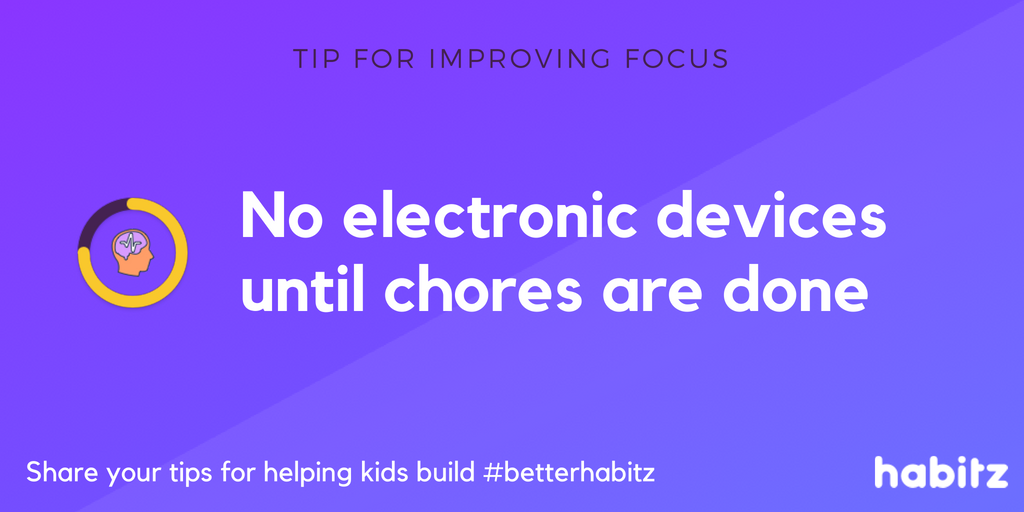
“We created a new rule that the kids aren’t allowed to use any electronic devices until they’ve completed their chores. It reinforces the principle of work before play because they have to get chores done before they can engage in mindless entertainment in front of a screen.”
-Corrine, Wondermomwannabe.com | Tweet this!
Physically separating them from problematic digital devices can help them focus on what needs to get done. Use “out of sight, out of mind” to your advantage! This will also teach them to see that they really can live without those things — boosting their confidence and teaching delayed gratification.
14. Instill immediacy for chores
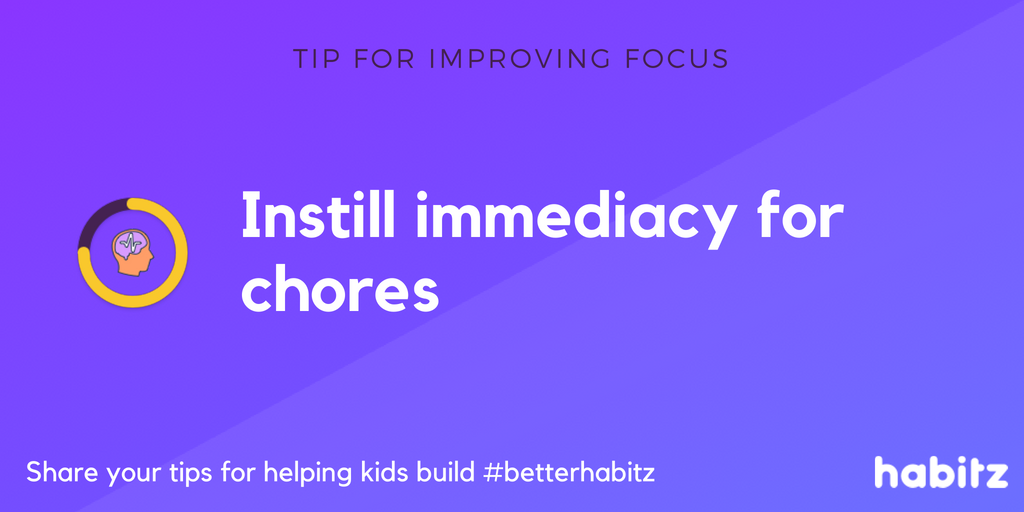
“Well, we say ‘clean it up when you see it’ pertaining to toys around house, trash on the floor, and trash outside. If you keep your house clean and help with the earth, it’ll be one more person to help and one less piece of trash.”
-Priscilla, Itspeachykeen.com | Tweet this!
A chaotic or messy area can really disrupt a kid’s capacity for concentration. Cultivate efficient clean habits so they can learn how to quickly create an atmosphere they can thrive in.
15. Promote routine as a framework for success
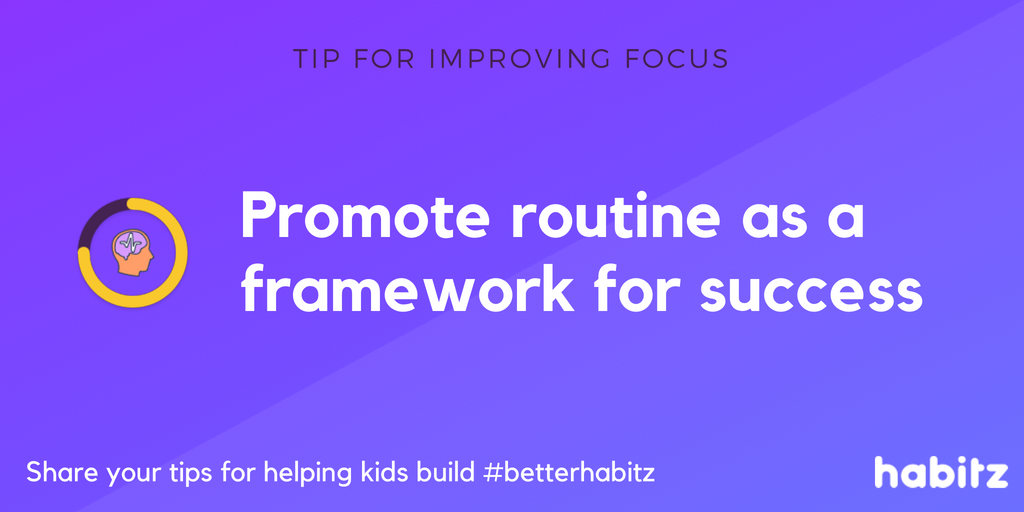
“I tell my kids that a routine is simply a plan to meet our goals placed within the realities of our day. It’s not set in stone, but it’s a framework that turns dreams into accomplishments.“
-Alicia Michelle, Yourvibrantfamily.com | Tweet this!
There are unfortunately only so many hours in a day that we can use to fulfill our goals. Kids should start to learn this from an early age not to stress them out, but to help them fulfill their potential.
16. Encourage imagination during “boring” errands
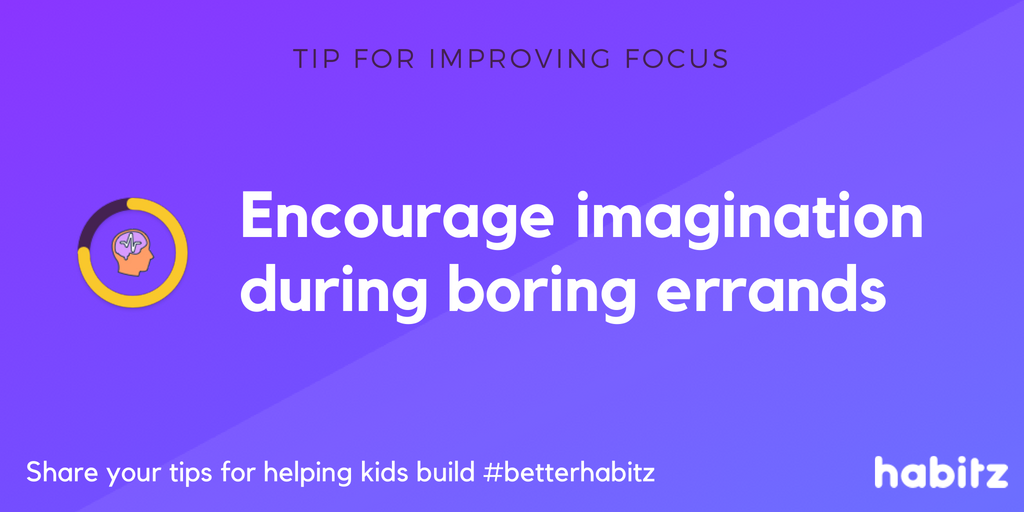
“The next time you have a lot of errands to run, suggest that your kid pretend she’s an alien who’s tagging along with you for the day to find out what Earthlings are like.”
-Kathleen M. Reilly, Parents Magazine | Tweet this!
Patience isn’t just waiting it out — it can be the source of imagination, creativity, and innovation. Turning common periods of time where they aren’t doing what they want to be doing opportunities for development really changes the conversation.
How Kids Can Build Healthy Strength Habits Mentally and Physically
Finally, let’s talk about strength. Although it can be related to all three previous “core” aspects of health, the strength that we’re talking about is about cultivating grit and strength of body, character, and self-control. This quality is all about creating value around endurance, and here’s how it’s done:
17. Emphasize fitness skills and proper form
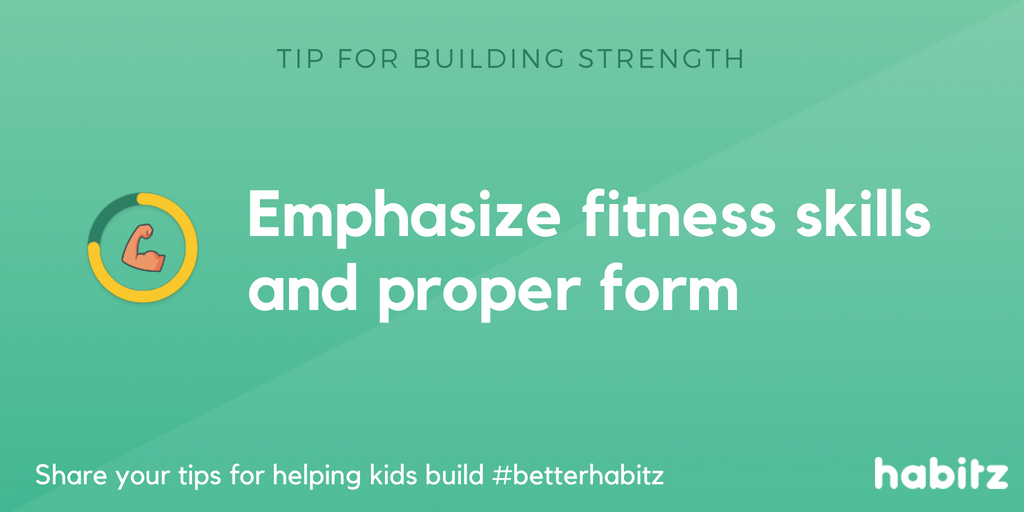
“Once children have mastered basic movements like burpees, push ups, pull ups, they are ready to progress to basic weight training… Emphasize form rather than the size of the load.”
-Nicole Crawford, Breakingmuscle.com | Tweet this!
If you want to instill the value of being physically strong in your household, it helps to focus on their technique rather than arbitrary weight goals. Just like the other techniques featured, this helps kids see the “why” in the task. Choose a physical activity you’re passionate about and it can become a real bonding moment for you and your kid.
18. Help them face your fears, one step at a time
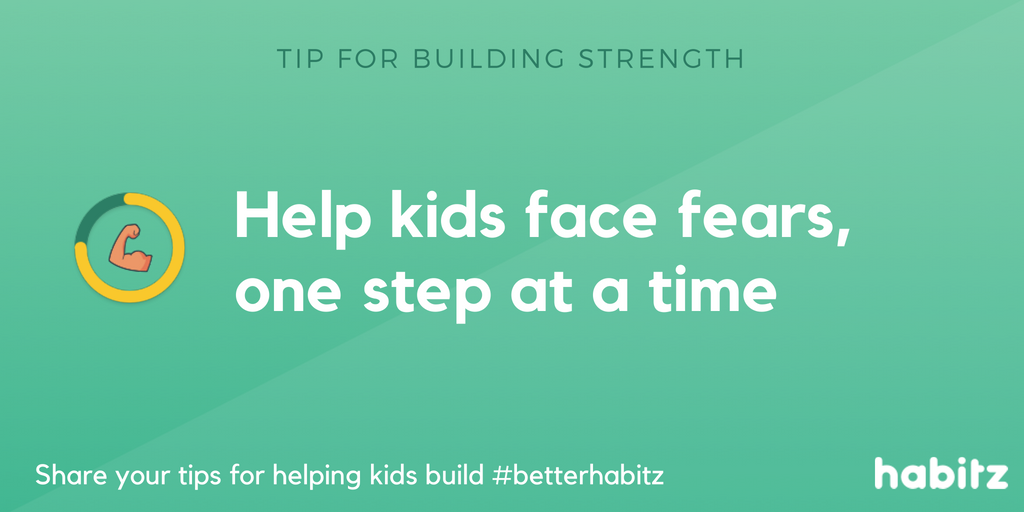
“Whether your child is afraid of the dark, or she is terrified to meet new people, help your child face her fears one small step at a time.”
-Amy Morin, VeryWellFamily.com | Tweet this!
There is some truth to that old saying: do something every day that scares you. Help your child understand that trying their best through hard circumstances is a good thing, and it can help them get through the tough challenges life will throw their way. Figure out a daily (or weekly) exercise that introduces them to a challenging part of life.
19. Encourage empathy and small acts of kindness
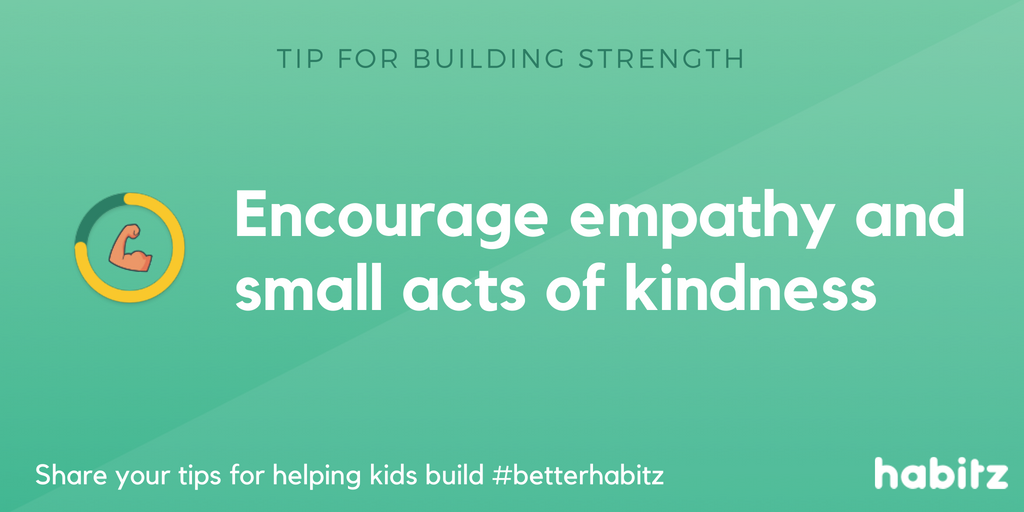
“I want to teach my boys that it’s important to show compassion to everyone we come into contact with, even if they don’t seem happy themselves.”
-Mandee, Raisingmy5sons.com | Tweet this!
Surprised that this one is a strength? Empathy is a muscle — and if it’s not tended to early and often, kids may develop more selfish tendencies. Normalizing both asking for help and giving help will make them into a responsible member of their community.
20. Be aware that children will follow your example
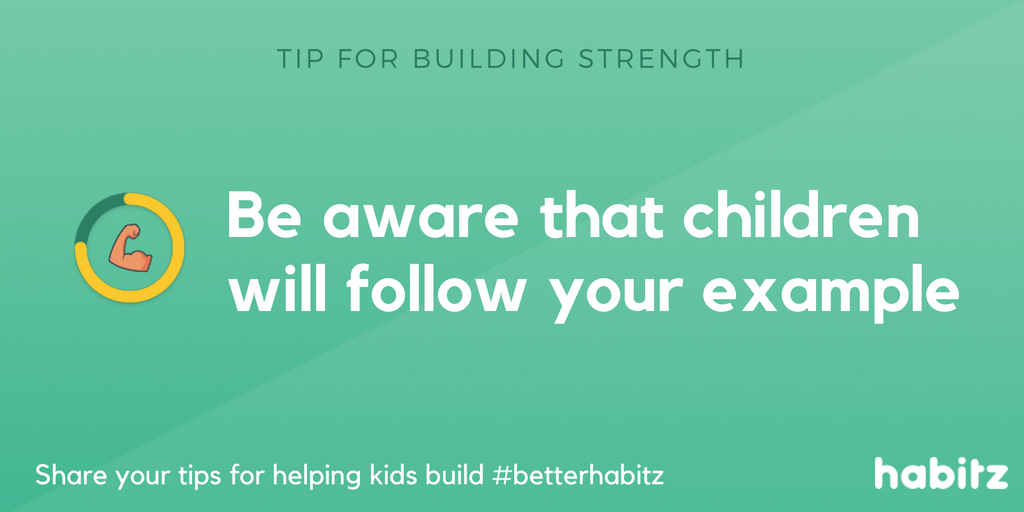
“Children look up to us, and oftentimes want to mimic every single thing we do, and when we take the time to actively demonstrate our own self-regulatory behavior, we are setting our kids up for success. Thinking before acting, practicing deep breathing, and being kind are all positive ways to help develop self-control.”
-Meraki Lane, Merakilane.com | Tweet this!
Remember: you are your kid’s biggest role model. If you include yourself in the tasks or qualities you want to teach your child, they’ll be more likely to want to be a part of it. Let them learn by example.
Putting Healthy Habits Strategies into Action
Now that you have some ideas on ways to cultivate those four core health aspects into your family’s routine, you might be wondering how to actually bring them to life.
This is where the Habitz app can help. Using AI technology and text-based storytelling, this app combines game-like elements with an emphasis on the four areas we covered. Plus, it’s got expert cred: along with being developed by parents and for parents, it was also created with the backing of pediatric dietitians, behavioral psychologists, and sports coaches.
Plug in one of the above strategies and try it out. If you’re using a healthy habits strategy of your own, help other parents out by using the #betterhabitz hashtag to share your routines, tips, and, tricks on social media. We’d love to hear about it!
Happy habiting!

